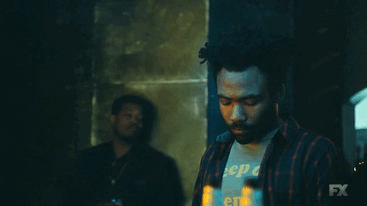Never have I seen one program grimly force its viewer into the harsh realities that many people know and understand on a daily basis, and just minutes later throw reality into the wind along with reason and concrete form, in a manner comparable to Donald Glover's beautiful and sprawling masterpiece, "Atlanta" (on FX). But I guess when you're Donald Glover/Childish Gambino/Young Lando, you don't really consider how other creatives go about things.
In a fascinating interview with the New Yorker, Glover explained that he wrestled with the network in order to create the kind of content that he truly wanted to make—something reflective of the African-American experience, which is far too little represented in the television realm in an authentic way.
"Atlanta's" brilliant trick is achieving authenticity by almost doing away with the realism. In the same manner as another brilliant work that tried to reflect a black experience, "Get Out" (dir. Jordan Peele, 2017), "Atlanta" creates new, unfamiliar territory by creating an artistic experience out of real experiences. "Get Out" used the genre of horror as its calling card, while "Atlanta" finds humor in its details, and both works churned out entirely new genres and pushed the boundaries of representing human lives (interestingly enough, Jordan Peele's previous acclaimed program "Key and Peele" similarly uses humor as a vessel for social commentary, even if their satire was a little more on the nose).
Atlanta in particular plays with reality in a way that truly creates a new brand of visual comedy (which, in television, hasn't been used for much more than slapstick, unfortunately). The episode "The Club" follows Donald Glover's character, Earn, being finessed by a particularly stingy nightclub owner, a cat-and-mouse chase that reaches its pinnacle when the owner slips into the shadows while Earn's back is turned, disappearing into a discreet panel in the wall.
And although this isn't really something that we can literally relate to (because who would actually have a revolving door built into a panel like that), the surreal image that "Atlanta" has created serves two purposes:
Firstly, it perfectly sets up and realizes Earn's feelings at this point, which is to say humiliated and confused. By adding a touch of surreal hyperbole to an episode that has generally remained grounded in reality to this point, it develops our understanding of this experience, how sometimes despite your best efforts, people seem to find a way to swindle you, as if by magic.
Secondly, it helps develop this show's world and consequentially, explore a very true reality. These intermittent doses of surrealism enhance the mythos of "Atlanta", for both the city and the show's diegesis. More potently, the show paints an acerbic picture of life on the margins of mainstream American society. The more surreal elements of the show serve to unflinchingly convey a social environment that many viewers and audiences are unaware of.
These two functions bolster our understanding of Atlanta and "Atlanta", as well as the characters' lifestyles and perspectives. We are
Season 2 of "Atlanta" is airing on FX on a weekly basis, and from what it seems, it's just as warped and uncompromising as its predecessor, and it's amazing to see that a television program of such weight and creative import can find success.















